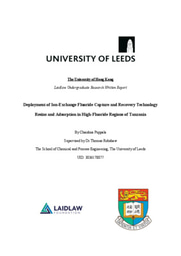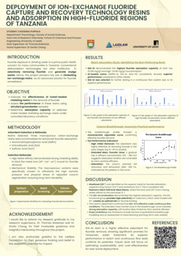Research Summary: Deployment of Ion-Exchange Fluoride Capture and Recovery Technology Resins and Adsorption in High-Fluoride Regions of Tanzania
In the high-fluoride regions of Tanzania, access to safe drinking water is a persistent public health crisis. Communities like those in the Rift Valley face a devastating paradox: the very groundwater essential for life contains elevated levels of fluoride, leading to widespread dental and skeletal fluorosis, pain, and disability. Current defluoridation technologies, while well-intentioned, are often inadequate; they struggle to remove fluoride selectively, generate problematic sludge waste, and are unsustainable for remote, resource-limited settings. This research summary presents a novel and promising solution to this critical challenge: the deployment of metal-loaded chelating ion-exchange resins. This study pioneers an innovative adsorption technology designed not only for the highly selective capture of fluoride ions but also for their potential recovery, addressing the dual problems of contamination and waste. By moving beyond conventional methods, this project aims to provide a sustainable, efficient, and scalable path to safe water access, offering new hope for protecting health and improving lives in affected Tanzanian communities.


Please sign in
If you are a registered user on Laidlaw Scholars Network, please sign in